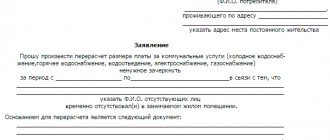Company employees use water, heating and other resources in the course of their work. Consequently, the company has a need to pay utility bills. Payments must be accounted for correctly.
Question: How to reflect the calculations for utility bills in the accounting of the lessor organization if, according to the lease agreement for non-residential premises, the tenant compensates the cost of the utilities consumed by him to the lessor in excess of the rent? View answer
What are the expenses?
Utilities include:
- Water supply and sanitation services.
- Central heating.
- Gas and electricity supply.
- Garbage removal.
Most often, two versions of compensation by the tenant for utility costs are used.
In the first situation, the tenant enters into the rental agreement a clause on the amount of rent, which is made up of two parts:
- The first part is fixed and provides for a fee for renting the premises.
- The second is unstable, which includes payment of utilities.
The second part of this paragraph may also take into account the costs of using the Internet, telephone and other components by agreement with the tenant. The landlord calculates the average monthly amount, which is sent to pay for utilities of the rented premises.
The procedure for paying utility bills is established in the lease agreement, and two types of payment are possible:
- Directly to the service provider.
- Through the lessor, by compensating him for these costs.
Accounting for payments from the tenant
The most comfortable option for the tenant is to include utility bills in the rent. Why is this convenient? The company will not have to contact utilities directly. No need to waste time processing payments. In this case, expenses will be included in other expenses. The basis for this is paragraph 1 of Article 264 of the Tax Code of the Russian Federation. The company renting the premises can deduct input VAT. This operation is performed based on the invoice. The postings will be like this:
- DT76 KT51. Payment of rent.
- DT20 KT76. Write-off for rental expenses.
- DT19 KT76. VAT accounting.
- DT68 KT19. Acceptance of VAT for deduction.
ATTENTION! The letter of the Ministry of Finance No. 07-05-06/234 dated September 6, 2005 states: if the payment for electricity is not included in the rent, the lessor will not issue an invoice. This payment is expected to be paid as compensation.
Agreement
According to paragraph 3 of Art. 1 to 44 Federal Law “On the contract system in the field of purchases of goods, works, services for the provision of government. and municipal needs” provides for the signing of a civil agreement, the subject of which is the provision of services.
Settlements that arise between the landlord institution and the tenant for utilities, operational and other services can be regulated by agreements that are concluded in accordance with the Letter of the Ministry of Property of Russia of 2001 “On the recommended terms of lease and free use agreements.”
This document establishes that utility costs should not be included in the rental payment.
Payments for them must be made by the tenant in accordance with various agreements for utility fees. Thus, the provision for payment of utilities should not be included in the real estate lease contract.
Writing an agreement for reimbursement of utilities
Reimbursement for utility services becomes legal when an appropriate agreement is written. At the beginning of the document, the two parties who participate in its signing are registered.
Then there are paragraphs that describe all the significant points of the document. The first point is the subject of the signed agreement.
In this situation, this will be compensation for utility costs by the tenant to the second party to the contract. Here you should list and write the services for which compensation is received.
Further, the agreement should specify the rights and obligations of the parties:
- In relation to the tenant, periods for monthly payment of services must be written, as well as an obligation to promptly notify the landlord about modifications in work related to the use of electrical energy and other resources. And also an obligation not to make any redevelopment of buildings and not to make changes to working communications without the consent of the owner of the premises. It is necessary to write a clause regarding compensation for losses caused by the tenant’s wrongdoing or negligence.
- The landlord is obliged to provide the tenant with utility bills at certain periods, written according to calculations, which are deciphered in a special appendix to this agreement. His obligations should also include timely notification of the tenant about changes in tariffs for the services provided. In addition, responsibility for good storage of utility networks and removal of instructions from inspection organizations.
The agreement has legal force from the period of signature. Both parties must follow it; failure to comply with the terms of the agreement can lead to unfortunate consequences.
A sample agreement for compensation for utilities can be downloaded from the link.
Contract for reimbursement of utility bills
When drawing up an additional agreement, an individual who is a tenant must be required to notify the landlord that an invoice has been issued to his residential property. It is also important to indicate the need to index payment amounts when tariffs change.
ATTENTION !!! It is better to draw up an agreement containing provisions on the procedure for reimbursement of utility bills separately, since in this case all the important points can be spelled out in more detail. If necessary, a sample can be found freely available on the Internet.
In this case of compensation, monthly at the end of the reporting period, the owner of the residential premises draws up an act for the provision of services, where he states all the amounts required to be paid. It is better to stipulate how the reporting documents will be drawn up and when the payment will be made in the text of this additional agreement.
Terms of the additional agreement
When using the rented premises, the tenant must keep it in the required technical and sanitary condition, and bear certain expenses under the lease agreement. Without the use of various utilities this is not possible, and the bills have to be paid by the tenant.
Even based on ordinary logic, the tenant must bear part of the costs of utility bills. It is precisely to ensure that there are no discrepancies on this pretext that a special approach has been created to create an option and form for paying compensation for these expenses.
One of the parties to the lease contract may not be satisfied with the version defining the method and amount of payment for utilities in the contract. Then, by agreement of the parties, a separate agreement for compensation for utilities can be signed.
The agreement itself is written on a typical form and is a legal document. a force that obliges the parties to strictly comply with the described circumstances.
Like similar documents, the agreement must be written correctly and accurately filled out. Corrections, cross-outs and other errors are not allowed. The agreement is written taking into account the views of the two parties and secured with signatures.
It is from the period of signing this paper that its action has legal force. The document is drawn up in two copies, one for each party to the contract.
In addition to the provisions described above, the significant terms of the agreement are:
- Price of services and sequence of calculations. The period that is calculated according to the signed agreement should be indicated here. The date of each month is also determined, no later than which the tenant must make payments to compensate for utility costs.
- Indication of the period of operation of the document. Here you should write the date the agreement was signed and the period for which it was signed.
- The contract clause resolves potential conflicts between the parties. This is often done through negotiations or in court.
- Circumstances under which the agreement may be terminated.
- At the end of the agreement, the payment details of the two parties who signed the contract are written.
Read the article on how to rent a car from Absolut Leasing for legal entities. Where can I lease a car without a down payment for individuals? Find out further.
Features of accounting for utility payments
The volume of utility resources used is determined based on meter readings. If there are no meters in the premises, the volume of services provided is calculated based on the laws. For each communal resource, its own regulatory act has been created.
take into account utility bills under the simplified tax system ?
For example, for heating services, Federal Law No. 190 “On Heat Supply” dated July 27, 2010 is relevant. If representatives of the company do not agree with the accrued amount of resources, they can contact the structure involved in the supply of resources. If this structure agrees with the company’s claims, a document with changed data will be generated. Based on this document, the company issues an adjustment invoice.
Utility payments are accounted for on account 60. The following transactions appear as part of accounting:
- DT60 KT51. Transfer of payment.
- DT60/1 KT51. Posting is used if the agreement with the supplying organization specifies a condition for advance payment. Performed for the amount of the advance.
- DT60 KT60 “Advance” subaccount. This wiring is used in conjunction with the previous one. It is relevant when the company has received receipts. The payment debt is repaid in advance, transferred earlier.
Postings are carried out on the basis of an agreement on the provision of utility services and receipts.
How can a tenant account for reimbursement under a lease agreement for utility payments : electricity costs and other operating expenses?
Tax risks
Tax risks associated with actions to compensate utility costs are largely determined by the ambiguity of the approach to this issue by experts from the Ministry of Finance and the Federal Tax Service of Russia.
Tax authorities consider payments purchased by an organization to compensate tenants for utility expenses as the organization's revenue from commercial work, subject to benefit taxation and VAT.
In terms of reducing these incomes by the amount of costs incurred by the organization to pay for the services used by tenants, the tax principle is as follows:
- If the organization’s payments to energy supply companies for utilities were made from the budget, then according to Art. 251 of the Tax Code of Russia, they do not reduce the tax base for income tax.
- If the calculation is done through the organization’s extra-budgetary account, then, according to Art. 321 of the Tax Code of Russia, the company’s expenses for paying utility services relate to the reduction of the tax base for income tax only in the commercial part of these expenses, assigned in proportion to the volume of contributions from budgetary and extra-budgetary sources.
Features of tax accounting of payments
Payment expenses will be recognized only when they are economically justified. Economic feasibility refers to the direction of spending on the immediate needs of the company. Ultimately, these expenses should generate income for the organization. For example, expenses will be justified if they go to pay for utilities needed for production needs. Expenses will not be justified when, for example, a company pays for utilities for an educational institution independent of it. In the latter case, payments do not appear when determining the tax base.
Expenses may be recognized as direct or indirect expenses.
If the company has entered into an agreement with the supplying authority directly, payments based on paragraph 1 of Article 254 of the Tax Code of the Russian Federation are recognized as material expenses.
The latter are, on the basis of paragraph 1 of Article 318 of the Tax Code of the Russian Federation, direct costs.
If the lessor pays for the services and the tenant reimburses the costs, the expenses are recognized in the structure of other expenses on the basis of paragraph 1 of Article 264 of the Tax Code of the Russian Federation. Other costs are considered indirect. They are reducing the income tax base in the current period. Direct costs must be allocated between work in progress and goods sold. Indirect expenses, in turn, do not remain in unfinished production.
Utility payments may also be included in the rent. In this case, they will be included in income tax expenses based on the instructions in paragraph 10 of Article 264 of the Tax Code of the Russian Federation. Will the costs included in the rent be direct or indirect? There is no clear answer to this question in the regulations. Therefore, the classification of payments as direct or indirect should be regulated by accounting policies. The ability to establish order in accounting policies is due to paragraph 4 of Article 252 of the Tax Code of the Russian Federation. Expenses are recognized on the basis of these documents:
- Agreement with resource providers.
- Lease contract.
- Payment papers establishing the fact of payment.
The period for attributing payments to expenses depends on the period specified in the primary documentation.
Methodology for calculating the solvency of the population for utilities
The calculation methodology is a unified methodological approach to calculating the amount of subsidies, improving the system for forecasting the number of people covered by the subsidy program and assigning the necessary funds.
Calculation of the population's ability to pay for housing and communal services is carried out for residents who live in the state and municipal housing stock of a specified administrative formation.
It is conducted by groups of citizens, united depending on their monthly average per capita income - a1-n, starting from 100 rubles. per month - a1 and ending with 2 thousand rubles and more per month - ap.
Accounting entries
If the provision of premises for rent is a normal type of work of the organization, the reflection of the profit received in accounting must be carried out in accordance with clause 5 of the Accounting Regulations “Company Income” PBU 9-99.
Accordingly, the rent must be determined as income from typical types of activities, and the costs of paying for utilities - as costs for typical types of activities.
In accounting, revenue is expressed in the form of rental payments for each posting counterparty: D-t 62, sub-account “Settlements with buyers and customers for services rendered” K-t 90, sub-account “Revenue from sales”.
Accounting for payments from the lessor
There are two options for paying for services by the landlord:
- Payments are included in the premises fee.
- Service fees are reimbursed by the tenant.
Accounting in these two cases will be performed differently.
Payments are included in the rental fee
The lessor will make payments on the basis of invoices. They will be included in the expenses. The accounting treatment is determined by whether the provision of premises for rent is the main activity of the lessor company. If this is the main activity, payments are included in expenses for ordinary activities. Otherwise, they are included in operating expenses. The lessor's transactions will be as follows:
- DT62 KT90/1. Profit from renting out the property.
- DT90/3 KT68. VAT accrual.
- DT26 KT60. Expenses for services.
- DT19 KT60. VAT claimed by the utility company.
- DT86 KT19. Acceptance of VAT for deduction.
- DT90/2 KT26. Writing off the cost of resources.
- DT60 KT51. Payment for services.
If leasing premises is the main form of activity, expenses based on paragraph 1 of Article 254 of the Tax Code of the Russian Federation are included in material expenses. If this is not the main activity, expenses can be included either in other expenses (clause 1 of Article 264 of the Tax Code of the Russian Federation) or in non-operating expenses (clause 1 of Article 265 of the Tax Code of the Russian Federation).
IMPORTANT! The tax authorities believe that compensation received from the tenant is considered income related to the provision of rental services. These revenues will multiply the VAT tax base on the basis of paragraph 1 of Article 162 of the Tax Code of the Russian Federation. The company providing the premises can deduct VAT transferred to utility structures in full.







